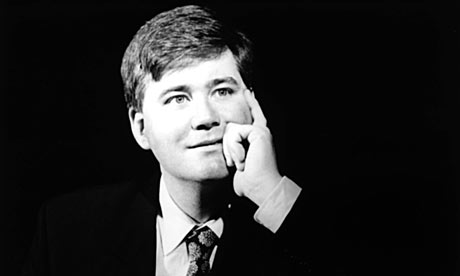
The following correction was printed in the Guardian's Corrections and clarifications column, Wednesday 9 September 2009
The pianist Geoffrey Tozer died on 21 August rather than 20 August as we said in the obituary below.
In an interview on ABC Radio in 1997, the Australian pianist Geoffrey Tozer described what it was like to have been a child prodigy. "It's like being an old man with no future. I wouldn't wish it on anybody, and the one who least wants it, of course, is the child. [Artur] Schnabel used to describe a child prodigy: there goes somebody with his future behind him." Nevertheless, the exceptional early promise shown by Tozer, who has died at the age of 54 from liver failure, made the transition to artistic maturity with both brilliance and depth.
Born in Mussoorie, in the Indian foothills of the Himalayas, he was brought up there until the age of four by his mother Veronica, a musician, and her British army officer husband, Colonel Donald Tozer, before moving with his mother to Melbourne; his father was Geoffrey Conan-Davies, a former colonial administrator in east Africa living in Tasmania, with whom his mother had had an affair while on a visit. In Melbourne, Geoffrey was educated at De La Salle college, an independent Catholic boys' school. His musical gifts were first nurtured by Veronica, before he began weekly flights across the 150 miles of the Bass Strait to study in Tasmania with Eileen Ralf. His later teachers included Maria Curcio and Theodore Lettvin.
At the age of nine, Tozer made his television debut, playing Bach's Concerto in F minor in a studio recording with the Victorian Symphony Orchestra (as the Melbourne Symphony Orchestra was then known). His unusual facility in improvisation was a skill that he was to develop throughout his career.
The pianist Stephen McIntyre recalls a visit from the 13-year-old Tozer, displaying a "bubbly, prodigious talent" in renditions of Mozart, followed by a faultless performance of a Scarlatti sonata that he had just heard for the first time. Puzzled that the Beethoven variations that came next were unfamiliar, McIntyre asked what they were. Tozer explained: "I wrote those myself. I like writing like other composers."
Tozer first came to international attention in 1969 when, helped by the first of his two Churchill fellowships, he became at the age of 14 the youngest semi-finalist in the history of the Leeds International Piano Competition. He made his European debut at the BBC Proms in 1970, at the age of 15, playing Mozart's Piano Concerto No 15 in B flat, K450, with Sir Colin Davis and the BBC Symphony Orchestra.
Over the course of the next 40 years, he gave recitals and played concertos on five continents, partnered by many of the great orchestras and conductors of the world. In Melbourne, he opened the new concert hall in 1982 with Prokofiev's Second Concerto, and in 1994 gave all 32 Beethoven piano sonatas in seven concerts over 11 evenings. During the last decade, his annual tours of China attracted a growing number of fans, and he was the first foreign performer there of the collectively composed Yellow River Concerto, notably in a live television broadcast in 2001.
Tozer has left an extensive recorded legacy, comprising rediscovered repertoire and premieres. In 1989, the future Australian prime minister Paul Keating, then the country's treasurer, instituted the Australian Artists Creative Fellowships, initially to support the stalling career of Tozer, whom he had met in Canberra when the pianist was teaching at his son's school. A number of highly regarded musicians were awarded generous grants, but it was Tozer who was targeted by the ire of some who saw only personal patronage.
The financial support and advocacy, nevertheless, helped to establish a fruitful relationship with the British label Chandos, which issued 36 CDs by Tozer between 1992 and 2009. A champion of the work of many under-recognised composers, such as Alan Rawsthorne, John Blackwood McEwen, Erich Korngold, Roberto Gerhard and Nikolai Tcherepnin, Tozer also had a special passion for the music of Nikolai Medtner, a recording of whose three piano concertos won a Diapason d'Or in 1992. Several recordings of historic significance await release, such as the partnership of Tozer and the tenor Gerald English in Tippett's song cycle Boyhood's End.
Despite periodic misgivings over the difficulties of maintaining an international career from his base in Melbourne, Tozer was a genuine enthusiast for the history and byways of his home city. Deeply affected by the deaths of his mother, in 1996, and his long-term manager, Reuben Fineburg, the following year, Tozer became unwell. He nevertheless continued his touring, recording and teaching at the Conservatorium of Music and the Australian National Academy of Music in Melbourne.
I remember Geoffrey as a warm-hearted musician of extraordinary learning and ability. His enthusiasm for music was so wide-ranging that he would delight in turning pages for colleagues and seek opportunities to play for children. He loved to be surrounded on stage by a young audience, crying: "Now give me a song and I'll play it for you!" Geoffrey's connection with young colleagues was an expression of an innate understanding of the value in maintaining a childhood presence within the adult artist, often whimsical, sometimes impish, but always with great charm.
• Geoffrey Peter Bede Hawkshaw Tozer, pianist, born 5 November 1954; died 20 August 2009

